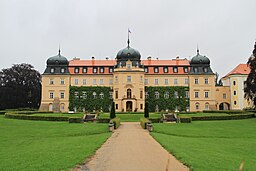Lány (Kladno District)
| Lány | |||
| Village | |||
|
Lány Castle
|
|||
|
|||
| Country | Czech Republic | ||
|---|---|---|---|
| Region | Central Bohemian | ||
| District | Kladno | ||
| Commune | Kladno | ||
| Municipality | Kladno | ||
| Elevation | 421 m (1,381 ft) | ||
| Coordinates | 50°07′23″N 13°57′02″E / 50.12306°N 13.95056°ECoordinates: 50°07′23″N 13°57′02″E / 50.12306°N 13.95056°E | ||
| Area | 34.09 km2 (13.16 sq mi) | ||
| Population | 1,979 (2011) | ||
| Density | 58/km2 (150/sq mi) | ||
| First mention | 1392 | ||
| Mayor | Karel Sklenička | ||
| Timezone | CET (UTC+1) | ||
| - summer (DST) | CEST (UTC+2) | ||
| Postal code | 270 61 | ||
| Statistics: statnisprava.cz | |||
| Website: www.obec-lany.cz | |||
Lány is a village in the Czech Republic, 35 km (22 mi) west of Prague, in Central Bohemian Region, outside the main road towards Karlovy Vary. It has 1610 inhabitants. Its major landmark is a castle, serving as a summer residence of Czechoslovak and later Czech Presidents. There is also a sports car museum and Museum of T. G. Masaryk, the first President of Czechoslovakia. Both President Masaryk and his wife are buried in the local cemetery.
The second oldest horse-drawn iron wagonway in continental Europe operated between Prague and Lány (originally planned to reach Plzeň) from 1830 until 1869. Its final station was in present-day forester's lodge Píně.
The word "Lány" in Czech means "fields" or "tracts (of land)".
Until 1918, the village was part of the Austrian monarchy (Austria side after the compromise of 1867), in the Schlan (Slaný) district, one of the 94 Bezirkshauptmannschaften (district office) in Bohemia. A post-office was opened in 1869.
The castle of Lány was first mentioned in 1392. It changed owners many times and underwent a major reconstruction in 1902–1903. In 1921, it was purchased by the Czechoslovak state and designated as an official summer presidential residence. Slovene architect Jože Plečnik was commissioned to make improvements both to the castle and the adjacent park. Tomáš G. Masaryk, the first President, liked the castle and was allowed to stay there after his abdication in 1935 until his death in 1937. During World War II, the castle was a residence of Emil Hácha, an increasingly ill and incapacitated President of Protectorate Bohemia and Moravia.
...
Wikipedia





